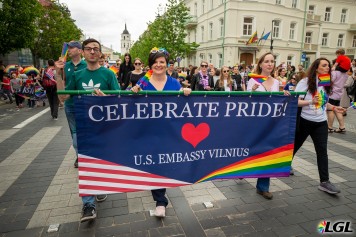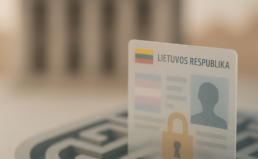Non-discrimination of minorities is one of the weakest points in Lithuania’s human rights record, according to a report on human rights practices in Lithuania for 2015 by the United States Department of State.
The United States Department of State reports that the most serious human rights problems are related to aspects of the justice system, children’s welfare, and intolerance toward minorities. Intolerance in Lithuania is manifested in the form of xenophobia, anti-Semitism, prejudice against ethnic minorities and against lesbian, gay, bisexual, transgender, and intersex persons (LGBTI).
Additional problems in 2015 included “antipropaganda” laws that restricted freedom of speech and expression. It is illegal to publish material that is “detrimental to minors’ bodies” or thought processes or that promotes the sexual abuse and harassment of minors, sexual relations among minors, or “sexual relations.” Human rights observers continued to criticize this law (see section 6, Acts of Violence, Discrimination, and Other Abuses Based on Sexual Orientation and Gender Identity). LGBTI groups claimed that it served as a rationale for limiting LGBTI awareness-raising efforts and that official bodies governing publishing and broadcast media took prejudicial action against coverage of stories with LGBTI themes.
Acts of Violence, Discrimination, and Other Abuses Based on Sexual Orientation and Gender Identity
According to the report on human rights practices in Lithuania for 2015, the society’s attitude toward LGBTI persons remained largely negative, and LGBTI groups claimed that official bodies that govern publishing and broadcast media took prejudicial action against certain works with LGBT themes. The few NGOs focusing on LGBTI problems did not face legal impediments. The National LGBT* rights organization LGL continued to promote an inclusive social environment for LGBTI persons.
The media reported acts of violence against LGBTI persons. LGL reported that in the first eight months of the year, 18 persons claimed they experienced physical attacks because of their sexual orientation.
An antipropaganda law enacted in 2009 served as a rationale for limiting LGBTI awareness-raising efforts (see section 2.a.). In July the European Commission’s Directorate General for Communication Networks, Content, and Technology began a formal investigation of a 2014 ruling by the Office of the Inspector of Journalistic Ethics that blocked television broadcast during regular broadcast hours of an LGBTI awareness video produced by LGL. The office cited the law on protection of minors to block the broadcast.
In June, when a prominent disk jockey posted homophobic messages on social media, President Dalia Grybauskaite stated, “the sooner Lithuania becomes more open and tolerant, the better it will be for the country.”




